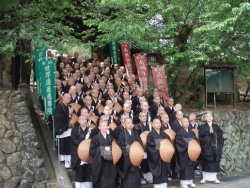Difference between revisions of "Jīvitindriya"
| (2 intermediate revisions by one other user not shown) | |||
| Line 1: | Line 1: | ||
[[File:Kudoyama2.JPG|thumb|250px|]] | [[File:Kudoyama2.JPG|thumb|250px|]] | ||
| − | [[Jīvitindriya]] ([[Sanskrit]] and [[Pali]]) is a [[Buddhist]] term translated as "[[life faculty]]" or "[[vitality]]". [[Jīvitindriya]] is identified as one of the seven [[universal]] [[mental factors]] within the [[Theravada]] [[abhidharma]] teachings. In this context, [[jīvitindriya]] is defined as a [[mental factor]] that sustains the [[life]] of the [[citta]] ([[mind]]) and other [[mental factors]] it accompanies. The characteristic of [[jīvitindriya]] is said to be “[[ceaseless watching]]”. | + | [[Jīvitindriya]] ([[Sanskrit]] and [[Pali]]) is a [[Buddhist]] term translated as "[[life faculty]]" or "[[vitality]]". [[Jīvitindriya]] is identified as one of the seven [[universal]] [[mental factors]] within the [[Theravada]] [[abhidharma]] teachings. In this context, [[jīvitindriya]] is defined as a [[mental factor]] that sustains the [[life]] of the [[citta]] ([[mind]]) and other [[mental factors]] it accompanies. The [[characteristic]] of [[jīvitindriya]] is said to be “[[ceaseless watching]]”. |
| − | Within the [[Mahayana]] [[Buddhist]] teachings, there are a variety of definitions for [[jīvitindriya]]. The [[Dharmaskandhapadashastra]] (an early [[Abhidharma]] work of the [[Savastivadin]] school) defines [[jīvitindriya]] as: a faculty that persists, continues, maintains, animates, and operates what we called [[sentient beings]]. | + | Within the [[Mahayana]] [[Buddhist]] teachings, there are a variety of definitions for [[jīvitindriya]]. The [[Dharmaskandhapadashastra]] (an early [[Abhidharma]] work of the [[Savastivadin]] school) defines [[jīvitindriya]] as: a {{Wiki|faculty}} that persists, continues, maintains, animates, and operates what we called [[sentient beings]]. |
| − | ==Etymology== | + | =={{Wiki|Etymology}}== |
Jīvitaṃ means “[[life]]”, and [[indriya]] means “[[controlling faculty]]”. | Jīvitaṃ means “[[life]]”, and [[indriya]] means “[[controlling faculty]]”. | ||
| Line 13: | Line 13: | ||
[[Category:Theravada Buddhism]] | [[Category:Theravada Buddhism]] | ||
[[Category:Buddhist Terms]] | [[Category:Buddhist Terms]] | ||
| − | + | {{PaliTerminology}} | |
| − | + | {{SanskritTerminology}} | |
Latest revision as of 07:20, 26 August 2014
Jīvitindriya (Sanskrit and Pali) is a Buddhist term translated as "life faculty" or "vitality". Jīvitindriya is identified as one of the seven universal mental factors within the Theravada abhidharma teachings. In this context, jīvitindriya is defined as a mental factor that sustains the life of the citta (mind) and other mental factors it accompanies. The characteristic of jīvitindriya is said to be “ceaseless watching”.
Within the Mahayana Buddhist teachings, there are a variety of definitions for jīvitindriya. The Dharmaskandhapadashastra (an early Abhidharma work of the Savastivadin school) defines jīvitindriya as: a faculty that persists, continues, maintains, animates, and operates what we called sentient beings.
Etymology
Jīvitaṃ means “life”, and indriya means “controlling faculty”.
